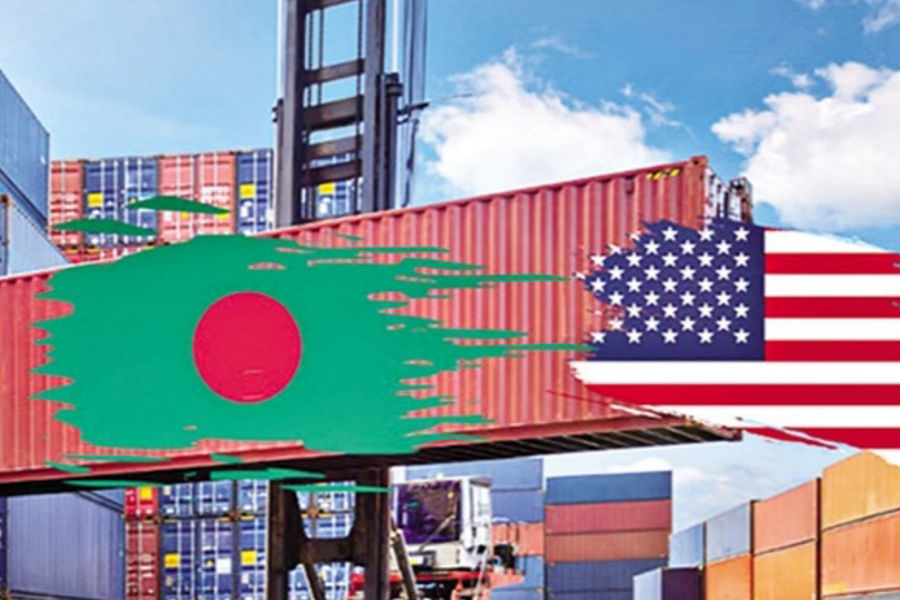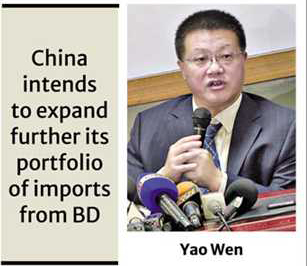Beijing eyes China-BD-Pak trilateral ties
'US-BD tariff talks concern sovereignty, economic future'
Chinese envoy tells Dhaka meet tariff 'unilateralism' also violates WTO rules

Published :
Updated :

US-BD tariff talks concern sovereignty, economic futureChina's Bangladesh ambassador alerts that the ongoing Dhaka-Washington tariff negotiations bear significant implications for Bangladesh's sovereignty and economic future, terming the US approach "unreasonable and unethical".
Speaking at a session of DCAB Talks hosted Tuesday by the Diplomatic Correspondents Association of Bangladesh, Ambassador Yao Wen expressed concern over the United States' planned 35-per cent tariff on Bangladeshi exports, particularly targeting garment and leather sectors.
"The United States imposes a 35-per cent tariff on Bangladesh, one of the least-developed countries, which is neither reasonable nor ethical," said the Chinese envoy, while list his country's growing trade and investment engagement with Bangladesh.
Mr. Yao extended Beijing's support for Bangladesh's right to resolve the disputes through "equal dialogue" and defended the country's legitimate trade interests. "China supports Bangladesh in upholding WTO rules and the multilateral trading system and in maintaining normal trade and exchanges."
He warns against the global consequences of trade "unilateralism". "If international trade returns to the law of the jungle, where the strong prey on the weak, no country will remain unscathed," he told the diplomatic reporters, underscoring the importance of multilateralism.
In a strongly worded statement, Mr. Yao criticised the US policy of "reciprocal tariffs," which he described as "a textbook case of trade bullying".
"Since the Trump administration took office, the US has rolled out a series of unilateral tariffs. These blatantly violate WTO rules, disrupt global industrial and supply chains, and hinder world economic recovery. They are irresponsible, unpopular, and unsustainable," he said.
The Chinese diplomat deplores that the US is now "weaponising tariffs to strong-arm others into so-called reciprocal tariff negotiations. This is nothing but hegemonic politics and unilateral bullying disguised as reciprocity."
In response to a question about Bangladesh's upcoming elections, Mr. Yao said China supports a "smooth, successful, and participatory" electoral process on the cusp of transition from the post-uprising interregnum. However, the timing of the election is for the people of Bangladesh to decide -- not any foreign country.
He also confirms that China supports the interim government's efforts to ensure stability and continue along a development path aligned with Bangladesh's national priorities.
Mr. Yao further reveals that China's engagement with the opposition Bangladesh Nationalist Party (BNP) and the Islamist party Jamaat-e-Islami had been 'hindered and prevented' for the last decade. "You know it!" he remarked cryptically when pressed for clarification.
He notes that recent visits by BNP, Jamaat, and the National Citizen Party leaders to China signal renewed openness and engagement.
"China has always engaged with major political parties in Bangladesh, and now there is a chance for that dialogue to resume."
Ambassador Yao said China remained committed to deepening cooperation with Bangladesh across multiple sectors -- from trade and investment to climate response and education.
"China is willing to always be a trustworthy good friend, good neighbour, and good partner of Bangladesh," he said, adding that China is ready to strengthen exchanges on governance experience and share experience in economic development, poverty alleviation, disaster prevention and mitigation, and climate-change response.
The ambassador mentions that China has granted zero-tariff treatment to 100 per cent of taxable items from Bangladesh until 2028 to support the country's smooth graduation from its least-developed country (LDC) status in 2026.
In the first quarter of this year, Chinese investment in Bangladesh surged 3.7 times year on year. Since August, nearly 20 Chinese companies have signed agreements with Bangladeshi counterparts, with investment intentions exceeding $400 million.
"China has become largest source of FDI in Bangladesh since the interim government took office," Mr Yao told the meet.
On a more somber note, Mr Yao confirmed that China will assist Bangladesh in investigating the crash of a China-made Air Force jet that hit a school building in Dhaka's Uttara area on July 21, killing 34 people, most of them children.

"We are sending a technical team to Dhaka on Wednesday in response to Bangladesh's request," he said, adding that China expects a "comprehensive and impartial" investigation into the tragedy. In a show of solidarity, China dispatched an emergency medical team of five burn-specialist doctors and nurses to Dhaka to treat survivors of the crash.
Highlighting growing trade relations, Mr. Yao notes that Bangladeshi mangoes have recently entered the Chinese market for the first time, and China intends to expand its import portfolio further.
He adds that weekly air traffic between the two countries now exceeds 68 flights, carrying more than 13,000 passengers. Approximately 15,000 Bangladeshi students are currently pursuing higher education in China, he said.
"Regardless of any domestic changes in Bangladesh, China will remain committed to strengthening bilateral trade and investment cooperation and supporting Bangladesh in its efforts toward sustainable development," the ambassador reaffirms Beijing's stand.
Ambassador Yao also addressed recent trilateral-cooperation talks involving China, Bangladesh, and Pakistan. A vice-foreign minister-level meeting was held in Kunming to revive stagnant cooperation in South Asia.
"The objective is to enhance regional collaboration," he said. Asked why only two South Asian countries involved, he noted that China had briefed other countries in the region.
He acknowledges Bangladesh's growing significance in China's regional diplomacy.
mirmostafiz@yahoo.com


 For all latest news, follow The Financial Express Google News channel.
For all latest news, follow The Financial Express Google News channel.